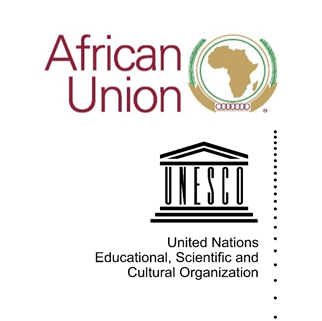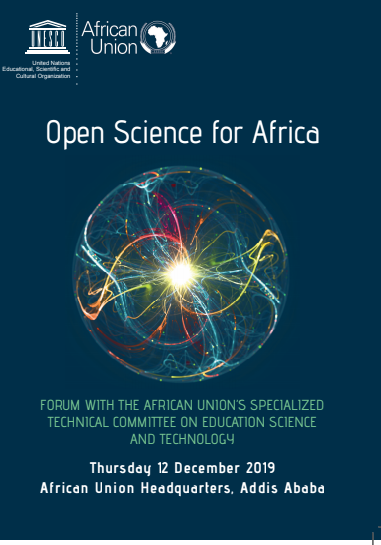
Open Science for Africa – African Union Commission-UNESCO Forum
FORUM WITH THE AFRICAN UNION’S SPECIALIZED TECHNICAL COMMITTEE ON EDUCATION SCIENCE AND TECHNOLOGY
Thursday 12 December 2019
African Union Headquarters, Addis Ababa
Background
Open communication of the scientific data, results, hypotheses and opinions, lies at the very heart of the scientific process. Open Science is the growing global movement to make scientific research and data accessible to all. It is not only an issue of science being open to the research community, as in “open access” and “open data”, Open Science refers to a science open to society.
Open Science could be a game changer for achieving the Sustainable Development Goals, particularly in Africa, least developed countries, landlocked developing countries, and small island developing States (SIDS), as it has the potential to significantly increase scientific discovery and facilitate adoption of well-adapted technologies for enhancing economic competitiveness, supporting sustainable development and alleviating poverty.
The African Open Science Platform has recently been launched demonstrating the importance of Open Science for Africa and for countries that need to strengthen their scientific systems and benefit from the results of science produced worldwide. The vision is for African scientists to be at the cutting edge of contemporary, data-intensive science as a fundamental resource for a modern society; to be innovative global exponents and advocates of Open Science; and as leaders in addressing African and Global Challenges. This vision is thus fully in line with the African Agenda 2063 and the Science, Technology and Innovation Strategy for Africa (STISA-2024).
But some challenges, such as access to internet across the continent, political governance of Open Science and the standardization of services and platforms, to name a few, still remain for Open Science in Africa. As the movement grows globally, it is important to ensure that all countries in all regions have a voice on Open Science.
UNESCO is the only platform where a global consensus on Open Science, including on the definition of Open Science, can be built. The Organization is therefore embarking on a global consultation on Open Science to provide an opportunity to discuss and clarify challenges and opportunities, benefits and risks of Open Science to all regions, including those where the debate on Open Science is still in its infancy.
In this context, UNESCO is partnering with the African Union and its Specialized Technical Committee (STC) on Education, Science and Technology to discuss the potential of Open Science for Africa. This partnership is set to explore how Open Science could contribute to closing the STI gaps and give a boost to the race towards the achievement of the SDGs in Africa and the Agenda 2063.
Objectives of the Forum
Organized in conjunction with the meeting of the African Union’s Specialized Committee on Education Science and Technology held on 10-11 December and followed by the Ministerial level meeting on the 13 December, the objectives of the Open Science Forum are the following:
- Bring together the members of the STC and the main stakeholders of Open Science in Africa
- Discuss the meaning, scope and opportunities of Open Science between policy makers and experts form academia and the private sector
- Define the key opportunities and challenges of Open Science in Africa with suggestions on how to overcome them.
- Discuss the need for Open Science to ensure that that no one is left behind, including through policy incentives
- Discuss the engagement of African Diaspora in the field of Open science
The summary of the discussions will be reported to the Ministerial level meeting taking place on 13 December and will feed into the process led by UNESCO on building a global consensus on Open Science, including through a UNESCO Recommendation on Open Science expected to be adopted by the UNESCO General Conference in 2021.
Programme
|
Agenda |
|
|
8:15-9:00 |
Welcome breakfast |
|
9:00-9:10 |
Introduction by the African Union Commission H.E. Prof. Sarah Anyang Agbor, Commissioner for Human Resources, Science and Technology |
|
9:10-9:30 |
Introduction by UNESCO Dr. Shamila Nair-Bedouelle, Assistant Director-General for Natural Sciences |
|
9:30-10:00 |
Keynote speech “Open Science in Africa – The Future of Science and Science for the Future” Dr Molapo Qhobela, Chief Executive Officer of the National Research Foundation, South Africa |
|
10:00-11:30 |
Comments from experts and questions from the audience
|
|
11:30-11:45 |
Coffee/tea break |
|
11:45-12:45 |
Moderated discussion with STC members and invited experts on
|
|
12:45-13:00 |
Conclusions and closing |
|
13:00 |
Lunch |
